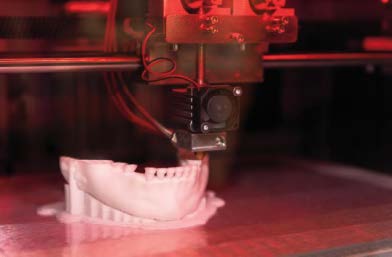3D PRINTING IS DISRUPTING THE WAY WE PROVIDE PERSONALIZED MEDICINE
3D printing is disrupting the way we provide personalized medicine, finds IDTechEx Research. From its humble beginnings in the late 1980s, through to the global force that it is today, the capabilities of 3D printing technology have expanded dramatically, to establish itself as an attractive manufacturing solution for prototyping and production.

Conferring advantages such as shorter lead times, reduced waste and opportunity for mass customization, the potential of 3D printing was quickly realized and has gone from strength to strength since. One of the key industries to have successfully leveraged these advantages is the medical and dental industry. In the IDTechEx Research report, 3D Printing in the Medical and Dental Industry 2019 – 2029, 3D printing
in the medical and dental industry is forecast to be worth over $8.1 billion by 2029. View the report on trends, opportunities and outlook at idtechex.com/research/reports/3d-printing-in-the-medical-and-dental-industry-2019-2029
3D PRINTING STREAMLINES THE PRODUCTION OF PERSONALIZED MEDICAL DEVICES
3D printing allows the production of a wide range of devices such as hearing aids to Invisalign® aligners to prosthetic limbs. Use of 3D printing in these applications leverage its ability for mass customization from 3D imaging data. Personalization is particularly important to medical devices designed to be worn by the patient for extended time, as this improves patient comfort, and with that, adherence to the treatment. No manufacturing process in the medical sector has been as disrupted by 3D printing as that of the hearing aid. 3D printed hearing aids are made with digital precision, an improvement over the lengthy hand-crafting process that sometimes resulted in pieces that were not perfectly fitted. This is important where less than a millimeter of difference can lead to discomfort for the wearer. Thus, adoption of 3D printing has not only streamlined but also enhanced the manufacturing process. Given these benefits, 3D printing is gaining popularity in the field of dentistry, and is also emerging as a method of manufacture for several other medical devices where customization is key to improved patient comfort and improved therapeutic outcomes. Compared to traditional manufacturing workflows, 3D printing confers several potential advantages to the dental industry.
3D PRINTING IMPROVES SURGICAL OUTCOMES
The range of applications is not limited to the manufacture of medical devices. 3D printing is also used extensively in surgical procedures, whether in the creation of patient-specific 3D models for teaching, planning and visualization, intraoperative surgical guides, disposable surgical instrumentation, or custom plates, implants, valves, and stents to be implanted into the patient. 3D printing advances surgical standards and improves efficiency, resulting in improved surgical outcomes for the patient. 3D printed implants are durable, lightweight and customized to fit the patient for better functional and aesthetic outcomes.
3D PRINTING WILL PROVIDE PERSONALIZED MEDICINE
The range of applications is not limited to medical devices or surgery. 3D printing can used to manufacture pharmaceuticals, such as patient-specific pills. Personalized medication is especially promising in disrupting the way we treat chronic conditions, by helping patients streamline the number of pills that they must take, and by creating patient-specific dosages that will limit the unwanted side effects experienced. Moreover, as the development of 3D bioprinting continues to evolve, there is scope for the implantation of personalized organs as part of regenerative medicine.
3D PRINTING IN THE MEDICAL AND DENTAL INDUSTRY
IDTechEx's recently published research report, 3D Printing in the Medical and Dental Industry 2019 – 2029 draws from extensive IDTechEx expertise within the field of 3D printing. IDTechEx analysis of 3D printing and 3D bioprinting technologies, as well as 3D printing materials and 3D printing software, is provided in context of medical and dental applications. A 10-year market forecast for 3D printed medical devices and 3D bioprinting is also provided, which is accompanied by IDTechEx market and regulatory outlooks.
The report is organized by the following key topics: • Surgical tools, guides, and models • Implantable devices • Dental tools, models, and prosthetics • Orthoses, protheses and other medical devices • Pharmaceuticals • Living tissues Each stand-alone chapter includes the motivations and restraints of adopting 3D printing, analysis of commonly used 3D printing technologies and 3D printing materials, detailed applications and case studies, and a discussion of specific regulatory concerns. To find out more contact research@IDTechEx.com or visit IDTechEx.com/3Dmed
AUTISM STUDY FINDS HIGH RATES OF UNMET HEALTHCARE NEEDS
An Autism Speaks analysis of national survey identifies barriers to care and provides guidance for new programs to address needs across the lifespan.

TOUGH CHALLENGES: Children with autism face a variety of unmet healthcare needs, including no or low-quality health insurance, no access to family-centered care, adverse childhood conditions and other parental challenges such as financial hardship, difficulties caring for the child, unemployment and being a single parent.
A new analysis of the National Survey of Children's Health finds that nearly a fifth of children with autism (18.8 percent) have unmet healthcare needs. This contrasts to 9.6 percent of children with other disabilities and 2.6 percent of children without disabilities.
The analysis also identifies the circumstances most strongly associated with unmet healthcare needs among children with autism. And it provides guidance on how public programs can better address these disparities across the lifespan.
The report, by Autism Speaks science and public policy experts, appears in the Journal of Autism and Developmental Disorders. It's based the 2016 National Survey of Children's Health. This federally funded survey of more than 50,000 parents recently made headlines for its finding that autism rates may be significantly higher than official estimates by the Centers for Disease Control and Prevention.
COMPLEX HEALTHCARE NEEDS
According to the national survey, 93 percent of children with autism have one or more co-occurring health conditions, compared to 62 percent of children with other disabilities. This finding is backed by considerable research associating autism with high rates of many medical and mental health issues, including seizures (epilepsy), digestive disorders, disrupted sleep, anxiety and depression, among others.
BARRIERS TO CARE
Yet these complex medical needs were not the sole or even the primary driver behind the disparities in access to needed services, according to the new analysis. The circumstances strongly associated with unmet healthcare needs among children with autism were: • no or low-quality health insurance • no access to family-centered care (care that includes families as partners in their child's healthcare) • adverse childhood conditions (family separation, divorce, physical or emotional abuse and domestic violence in the home, etc.) and, • parental challenges (financial hardship, difficulties caring for the child, unemployment and being a single parent, etc.).
PROPOSED POLICIES AND PROGRAMS
"These findings make clear that the unmet healthcare needs faced by children with autism are substantially related to factors best addressed through policies and programs that strengthen the ability of families to care for their children," says study leader Arun Karpur, Autism Speaks director for data science and evaluation research.
"Programs supporting children with autism and their families need to integrate social supports across a broad range of needs including education, workforce development, healthcare and other welfare programs," Dr. Karpur adds. Currently, he says, these types of public programs operate separately, increasing a family's difficulty in accessing them.
Have concerns or questions about autism? Get personal guidance from Autism Speaks' trained Autism Response Team at 888AUTISM2 (288-4762); en Español 888-7729050; or familyservices@autismspeaks.org You can also learn about the signs of autism, screening and diagnosis, associated health conditions and autism treatments and more at autismspeaks.org